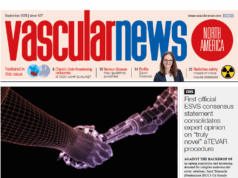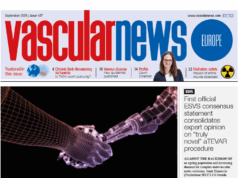
Tara Mastracci (Barts Health NHS Trust, London, UK) writes about the recent creation of a European Society for Vascular Surgery (ESVS) Equality, Diversity and Inclusion (EDI) task force.
The news of the ESVS’ decision to create an EDI task force, and its recent election of members of this task force from the population of vascular surgeons across Europe, should inspire hope in young vascular surgeons. Traditionally, the ESVS has been a society that has prioritised the more mature surgical viewpoints across Europe, however in recent years, some effort has been made to increase relevance to surgeons in training and those in their early careers. One example, the large expansion of the ESVS educational portfolio has been welcomed by many. I see the EDI task force as the next step in promoting diversity and broadening the relevance of the society.
Having representation of younger surgeons at the society level is essential to ensuring the populations of vascular surgeons leading discussion across Europe remain innovative and forward thinking. The path towards achieving diversity can be controversial and challenging and will be ineffective if we also don’t work towards embedding transparent inclusion in the process. By broadening the voices on the podium and in leadership positions, there may be an opportunity to increase the pool of mentors, and possibly inspire young surgeons into a career path they may not have formerly considered. I am looking forward to seeing the different ways the ESVS will grow and prosper as more young surgeons get involved, and the creative and innovative ways that traditional roles can evolve to include more diverse viewpoints.
In the hope of modelling the nurturing role that inclusive leadership can have, the EDI task force has nominated a young surgeon, Vaiva Dabravolskaite, as their lead, who will be supported by the all the members of the task force, and will hopefully continue to contribute to the society as she progresses through her career.
This broadening of scope need not be limited to the Society’s political agenda, as it has relevance to our clinical practices as well. As technology evolves, and economies struggle to deliver the latest technological advances in healthcare, disparity in our patient populations will also become more apparent. Being aware of the innovative ways our colleagues across Europe are meeting challenges will inform our local practice, and possibly broaden our research and clinical perspectives to make treatments more effective. As we struggle with the burden of social deprivation in the cardiovascular population in the UK, where I practise, we are beginning to better understand that non-clinical factors, and the broader determinants of health, have an impact on the effectiveness of the treatment we provide.
We need a deeper understanding of cultural and social context for the patients we treat to provide them with the care they need. Engaging a wider range of voices in the leadership and committees of our professional society may be the way to start building this knowledge.
The great Canadian thinker Marshall McLuhan said it best: “We become what we behold. We shape our tools, and thereafter our tools shape us.”
Tara Mastracci is the lead for endovascular aortic surgery at Barts Health NHS Trust in London, UK.
The views expressed in this article are those of Tara Mastracci and do not necessarily reflect those of the ESVS.













